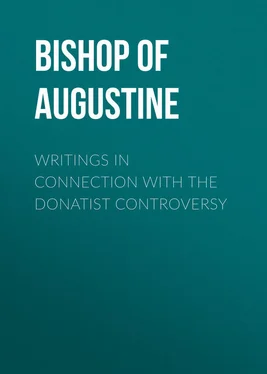Saint Augustine - Writings in Connection with the Donatist Controversy
Здесь есть возможность читать онлайн «Saint Augustine - Writings in Connection with the Donatist Controversy» — ознакомительный отрывок электронной книги совершенно бесплатно, а после прочтения отрывка купить полную версию. В некоторых случаях можно слушать аудио, скачать через торрент в формате fb2 и присутствует краткое содержание. Жанр: foreign_antique, foreign_prose, на английском языке. Описание произведения, (предисловие) а так же отзывы посетителей доступны на портале библиотеки ЛибКат.
- Название:Writings in Connection with the Donatist Controversy
- Автор:
- Жанр:
- Год:неизвестен
- ISBN:нет данных
- Рейтинг книги:3 / 5. Голосов: 1
-
Избранное:Добавить в избранное
- Отзывы:
-
Ваша оценка:
- 60
- 1
- 2
- 3
- 4
- 5
Writings in Connection with the Donatist Controversy: краткое содержание, описание и аннотация
Предлагаем к чтению аннотацию, описание, краткое содержание или предисловие (зависит от того, что написал сам автор книги «Writings in Connection with the Donatist Controversy»). Если вы не нашли необходимую информацию о книге — напишите в комментариях, мы постараемся отыскать её.
Writings in Connection with the Donatist Controversy — читать онлайн ознакомительный отрывок
Ниже представлен текст книги, разбитый по страницам. Система сохранения места последней прочитанной страницы, позволяет с удобством читать онлайн бесплатно книгу «Writings in Connection with the Donatist Controversy», без необходимости каждый раз заново искать на чём Вы остановились. Поставьте закладку, и сможете в любой момент перейти на страницу, на которой закончили чтение.
Интервал:
Закладка:
Chap. V. – 7. "Further," Cyprian goes on to say, "in vain do some, who are overcome by reason, oppose to us custom, as though custom were superior to truth, or that were not to be followed in spiritual things which has been revealed by the Holy Spirit, as the better way." 198 198 Cypr. Ep. lxxiii. sec. 11.
This is clearly true, since reason and truth are to be preferred to custom. But when truth supports custom, nothing should be more strongly maintained. Then he proceeds as follows: "For one may pardon a man who merely errs, as the Apostle Paul says of himself, 'Who was before a blasphemer, a persecutor, and injurious; but I obtained mercy, because I did it ignorantly;' 199 199 1 Tim. i. 13.
but he who, after inspiration and revelation given, perseveres advisedly and knowingly in his former error, sins without hope of pardon on the ground of ignorance. For he rests on a kind of presumption and obstinacy, when he is overcome by reason." This is most true, that his sin is much more grievous who has sinned wittingly than his who has sinned through ignorance. And so in the case of the holy Cyprian, who was not only learned, but also patient of instruction, which he so fully himself understood to be a part of the praise of the bishop whom the apostle describes, 200 200 2 Tim. ii. 24.
that he said, "This also should be approved in a bishop, that he not only teach with knowledge, but also learn with patience." 201 201 Cypr. Ep. lxxiv. sec. 12.
I do not doubt that if he had had the opportunity of discussing this question, which has been so long and so much disputed in the Church, with the pious and learned men to whom we owe it that subsequently that ancient custom was confirmed by the authority of a general Council, he would have shown, without hesitation, not only how learned he was in those things which he had grasped with all the security of truth, but also how ready he was to receive instruction in what he had failed to perceive. And yet, since it is so clear that it is much more grievous to sin wittingly than in ignorance, I should be glad if any one would tell me which is the worse, – the man who falls into heresy, not knowing how great a sin it is, or the man who refuses to abandon his covetousness, knowing its enormity. I might even put the question thus: If one man unwittingly fall into heresy, and another knowingly refuse to depart from idolatry, since the apostle himself says, "The covetous man, which is an idolater;" and Cyprian too understood the same passage in just the same way, when he says, in his letter to Antonianus, "Nor let the new heretics flatter themselves in this, that they say they do not communicate with idolaters, whereas there are amongst them both adulterers and covetous persons, who are held guilty of the sin of idolatry; 'for know this, and understand, that no whoremonger, nor unclean person, nor covetous man, who is an idolater, hath any inheritance in the kingdom of Christ and of God;' 202 202 Eph. v. 5.
and again, 'Mortify therefore your members which are upon the earth; fornication, uncleanness, inordinate affection, evil concupiscence, and covetousness, which is idolatry.'" 203 203 Col. iii. 5. Cypr. Ep. lv. sec. 23.
I ask, therefore, which sins more deeply, – he who ignorantly has fallen into heresy, or he who wittingly has refused to abandon covetousness, that is idolatry? According to that rule by which the sins of those who sin wittingly are placed before those of the ignorant, the man who is covetous with knowledge takes the first place in sin. But as it is possible that the greatness of the actual sin should produce the same effect in the case of heresy that the witting commission of the sin produces in that of covetousness, let us suppose the ignorant heretic to be on a par in guilt with the consciously covetous man, although the evidence which Cyprian himself has advanced from the apostle does not seem to prove this. For what is it that we abominate in heretics except their blasphemies? But when he wished to show that ignorance of the sin may conduce to ease in obtaining pardon, he advanced a proof from the case of the apostle, when he says, "Who before was a blasphemer, and a persecutor, and injurious; but I obtained mercy, because I did it ignorantly." 204 204 1 Tim. i. 13.
But if possible, as I said before, let the sins of the two men – the blasphemy of the unconscious, and the idolatry of the conscious sinner – be esteemed of equal weight; and let them be judged by the same sentence, – he who, in seeking for Christ, falls into a truth-like setting forth of what is false, and he who wittingly resists Christ speaking through His apostle, "seeing that no whoremonger, nor unclean person, nor covetous man, which is an idolater, hath any inheritance in the kingdom of Christ and of God," 205 205 Eph. v. 5.
– and then I would ask why baptism and the words of the gospel are held as naught in the former case, and accounted valid in the latter, when each is alike found to be estranged from the members of the dove. Is it because the former is an open combatant outside, that he should not be admitted, the latter a cunning assenter within the fold, that he may not be expelled?
Chap. vi. – 8. But as regards his saying, "Nor let any one affirm that what they have received from the apostles, that they follow; for the apostles handed down only one Church and one baptism, and that appointed only in the same Church;" 206 206 Cypr. Ep. lxxiii. sec. 11.
this does not so much move me to venture to condemn the baptism of Christ when found amongst heretics (just as it is necessary to recognise the gospel itself when I find it with them, though I abominate their error), as it warns me that there were some even in the times of the holy Cyprian who traced to the authority of the apostles that custom against which the African Councils were held, and in respect of which he himself said a little above, "In vain do those who are beaten by reason oppose to us the authority of custom." Nor do I find the reason why the same Cyprian found this very custom, which after his time was confirmed by nothing less than a general Council of the whole world, already so strong before his time, that when with all his learning he sought an authority worth following for changing it, he found nothing but a Council of Agrippinus held in Africa a very few years before his own time. And seeing that this was not enough for him, as against the custom of the whole world, he laid hold on these reasons which we just now, considering them with great care, and being confirmed by the antiquity of the custom itself, and by the subsequent authority of a general Council, found to be truth-like rather than true; which, however, seemed to him true, as he toiled in a question of the greatest obscurity, and was in doubt about the remission of sins, – whether it could fail to be given in the baptism of Christ, and whether it could be given among heretics. In which matter, if an imperfect revelation of the truth was given to Cyprian, that the greatness of his love in not deserting the unity of the Church might be made manifest, there is yet not any reason why any one should venture to claim superiority over the strong defences and excellence of his virtues, and the abundance of graces which were found in him, merely because, with the instruction derived from the strength of a general Council, he sees something which Cyprian did not see, because the Church had not yet held a general Council on the matter. Just as no one is so insane as to set himself up as surpassing the merits of the Apostle Peter, because, taught by the epistles of the Apostle Paul, and confirmed by the custom of the Church herself, he does not compel the Gentiles to Judaize, as Peter once had done. 207 207 Gal. ii. 14.
Интервал:
Закладка:
Похожие книги на «Writings in Connection with the Donatist Controversy»
Представляем Вашему вниманию похожие книги на «Writings in Connection with the Donatist Controversy» списком для выбора. Мы отобрали схожую по названию и смыслу литературу в надежде предоставить читателям больше вариантов отыскать новые, интересные, ещё непрочитанные произведения.
Обсуждение, отзывы о книге «Writings in Connection with the Donatist Controversy» и просто собственные мнения читателей. Оставьте ваши комментарии, напишите, что Вы думаете о произведении, его смысле или главных героях. Укажите что конкретно понравилось, а что нет, и почему Вы так считаете.












